
|

|
|
|
|
| | VOLUME 29, NUMBER 17 | WEDNESDAY, JANUARY 27, 1999 | ISSN 1199-5246 | | |
|
|
||||
|
|
The following is a synopsis of a newly published novel by York University social science professor Eric Koch. The book is titled Icon in Love: A Novel About Goethe (Oakville: Mosaic Press, 1998), 200 pp. $18. The name of Germany's state-funded cultural embassy is not analogous to the British Council or the Alliance Française; instead, it is the Goethe Institute. Johann Wolfgang von Goethe (1749-1832) serves as the icon of Germany's "good" face: of the "Volk der Dichter und Denker" (nation of poets and thinkers), in the German adaptation of Madame de Staël's description. The emblematic conception of Goethe extends to the small duchy where he pursued the career of a polymath, in collaboration with such fellow poets and thinkers as Friedrich Schiller and Wilhelm von Humboldt. For this association with Goethean humanism, Weimar was chosen in 1918 as the site of the new constitution of the first German republic. The transformation of Goethe into a sage from a great poet, who also did important and original work in science and critically observed and tried to influence other fields, occurred in his lifetime. However, it was the new German Reich's need for a national figure that from the 1870s made the cult of Goethe an official government affair. In reaction, some recent studies have deflated the simplified and bowdlerized image of Goethe. Professor Koch, who, after a career as producer and regional director with the CBC, teaches in the Division of Social Science as well as writing fiction and non-fiction, pays homage to Goethe the man, the poet, and the thinker, but with humour. He shares with the historical Goethe his birth-place, Frankfurt on the Main, and with his fictional Goethe his birth-date, 1919, and consequently the experience of twentieth-century public events and mentalities, the Zeitgeist. Where Goethe chose the late medieval necromancer Faustus to reflect on the condition of modern man in a period of radical change and revolutions, Koch uses Goethe to reflect on the mores, ideals, and problems of our own age. In allusion to the double plot of Goethe's Faust, Part One, namely the love tragedy and the scholar's tragedy, Koch invents, in a comedic vein, for Goethe our contemporary, firstly, a love story based on the historical Goethe's last love, for the young Ulrike von Levetzow, and secondly, a detective story, which the hero conceives as an "allegorical, historic race" between mystical intuition and computational logic, paralleling Faust's idealism and Mephisto's skepticism. The occasion for the crisis of this double plot is the Nobel awards ceremonies in 1992, where Goethe receives the prize for literature. (For the curious or aspirants, Koch provides a complete guide to Nobel Prize arrangements, customs, and lore.) Although peeved at being offered the award too late in his career, Goethe decides to accept it as a means of meeting again Ulrike, who is a student in Stockholm. He has welcomed and nurtured his love for her as the necessary remedy for his writer's block to finishing his Faust, Part Two. While Goethe is being "crowned" as the genius for the twenty-first century, which the media have dubbed the "New Goethean Age," a murder occurs. Its solution depends on the timely intervention of Goethe, the sorcerer, in allusion to Goethe's famous poem, "The Sorcerer's Apprentice." The apprentice is Ulrike's step-father, the "computerized" Kriminalinspektör. For the sake of the detective story aspect of the novel, no more of this here. Koch offers his novel as a "serious jest" - Goethe's own description of Faust. The portrayal of the four other award winners (including the brash physics winner from the University of Toronto) and their professional and sexual rivalries is satirical comedy in the manner of David Lodge's academic novels. For the role of Goethe's employer and patron, Karl-August Duke of Saxe-Weimar, Koch invents the media magnate Karl, who retains the fictional Goethe as a consultant and both finances and profits from his writings. This conceit leads to witty observations by the media-savvy author. A serious aim of Koch's is to "close the Goethe Gap" between the "cultural weight" of Goethe in German-speaking countries and foreign indifference or ignorance. Particularly among Germany's Anglo-Saxon cousins, as wittily discussed in an essay by D.J. Enright, entitled, "Aimez-Vous Goethe?: an Enquiry into English Attitudes of Non-liking towards German Literature" (1966). Koch fills in the background through preliminary overviews, quotations, allusions, and endnotes, and more importantly, he shows the relevance of Goethe's ideals to our time. For Goethe's oeuvre Koch invents analogous contemporary contexts and issues; for instance, Faust is a geneticist. The Nobel award cites, among other achievements, Goethe's optimism and his sense of the unity of man and nature. Both function as ironies in the plot as well as being endorsed by Koch as guiding principles for our future. Current ecological thought has in fact led to a re-evaluation of Goethe's organicist science. As well, the fictional Goethe's faith in the Green Party can now, since publication, be tested in the new Red-Green coalition in Germany. Gisela Argyle is a professor in the Division of Humanities, Faculty of Arts.
| |||
|
|
Stephen K. Hudson, founder and CEO of the Newcourt Credit Group, and a Schulich alumnus, with Dean Dezsö Horváth, Schulich School of Business at York University York University's Schulich School of Business has received a $2 million endowment from the Newcourt Credit Group to further develop the School's Financial Services Program. The Newcourt Credit Group is one of the world's leading sources of asset-based financing serving corporate, commercial and institutional markets. Founded four years ago at the urging of the financial services industry in Canada, Schulich's Financial Services Program is unique in North America, as the only integrated MBA specialization in financial services. It incorporates teaching, research and outreach related to banking, insurance, securities and trusts. As financial deregulation, global competition and amalgamation continue, Schulich graduates remain in high demand. Approximately one-third of the students at Schulich enter the financial services industry each year. Following an industry proposal presented in 1993, the Financial Services Progam was established with a gift of $1 million from the Canadian Imperial Bank of Commerce, followed by additional support from such financial organizations as The Royal Bank of Canada, First Marathon Securities Limited, McKinsey and Company, and Manulife Financial. The Newcourt gift will further strengthen the School's commitment to innovative teaching and cutting-edge research related to financial services. The endowment was presented by Stephen Hudson, founder and CEO of the Newcourt Credit Group, who received Schulich's 1997 Alumni Award for Outstanding Executive Leadership. Hudson, BBA'81, has been a good friend to York University. In addition to the Newcourt endowment, Hudson presented the Schulich School of Business with a generous personal gift for student support. As well, he regularly donates his time to his alma mater. He was a leading sponsor of last year's Brazilian Ball fundraising initiative, and sits on the Schulich Advisory Board. He was a keynote speaker at the recent LLB/MBA Conference, "Re-organizing Business for the New Millennium". "The Schulich School of Business at York University and the Newcourt Credit Group share the belief that Canada's ability to compete globally will depend increasingly on high quality management education programs," said Schulich Dean Dezsö Horváth. "We welcome the opportunity to join with Newcourt in setting a new standard for management education, and offer very special thanks to Newcourt founder and president, Stephen Hudson." The $2 million Schulich endowment is part of a $3.5 million gift to be shared with Ryerson Polytechnic University and the University of Toronto, and was donated through the Toronto Community Foundation. |
|||
|
|
It has already happened once this year - a winter storm dumped several feet of snow on the York campuses in just a few hours. When major winter storms do hit, the University usually suspends normal operations and programs at both the York campus and the Glendon campus as long as the storm is considered a weather emergency. While no-one can predict accurately what winter has in store for us this year, York's weather policy may help to make any storms we do get a little more bearable. The policy has been designed to address communication difficulties. You can obtain up-to-date information by tuning in to your radio or television, or by calling the University's weather information line at: (416) 736-5600. The University decides to declare a weather emergency when it is determined that conditions may prevent safe travel to and from York, or when the weather may have substantial adverse effects on normal University operations. The vice-president (administration) makes the decision, in consultation with the president and the chair of Senate or their delegates, about whether to adopt emergency procedures or to suspend normal operating procedures, including cancellation of classes/examinations. According to York's emergency weather policy, whether or not special events are cancelled is within the discretion of those directly responsible for organizing the event. It is assumed that decision-making and associated communications will be adapted, as appropriate, to suit the circumstances. In case of weather emergencies, the following guidelines will be in effect:
Usually, a decision to declare weather emergencies will be made:
|
|||
|
|
by Jennifer Castle I must say, I didn't know what to expect when I went to see the Theatre@York production of The Piano, written by Trevor Griffiths and directed by Michael Najjar. I had never heard of it before and I had also never gone to see a play with the intention of reviewing it. The combination intimidated me, and I think it showed at first. I got there just before it sold out, and entered the theatre just in time. There were still some seats but it was filling up fast. Now, I'm not going to say that I am a first-impressions kind of girl, although, concerning theatrical performance, I generally make up my mind early on. I see if the actors give off emotions that I can capture and hold onto. They did, and so for me, the play went on. The Piano is a great play about a circle of upper class relatives, some related by blood and others by marriage. The characters come together during a time when the social structure of Russia is on the brink of a huge change. An attempted dinner party between friends doesn't seem too hard to picture, does it? But as the play develops, it's not the social elegance of the characters that you end up noticing, but the urgent need to define themselves when everything else is being defined for them. It is not only a political play about the new social and political movements of the time - Darwinism, humanism, feminism - but also a play about the personal struggle with age; how it can creep up and leave you surrounded with empty promises years later, living an insincere everyday life. The portrayal of structure also illustrates the lower class. One of the opening scenes is of two serfs carrying a huge self-playing piano, taking breaks that allow one of the fellows to tell animated stories about the rich people he has worked for. He is brilliant when he speaks, insightful and witty, angry and expressive. The audience can tell that he is capable of much more inspiring work. In a later scene, another serf brings the piano to the rich people and then pretends to play it. The family, thinking that the serf is playing the piano, watches with disbelief. Someone exclaims something like a "poor kid can't play music," branding the poor as talentless. It was subtle but I got it. Even though that serf was not playing, it was ironic and ridiculous to hear one of the most uncreative characters of the play insult one of the most creative. The judgement was based on money rather than on talent, and I appreciated the message. The play was filled with moments of irony and humour, and had some of the best comic relief I've seen in a while - which was much needed in the play. I don't want to describe The Piano as pessimistic. It surely is not, but it is a reminder that the world takes all of our aspirations, and turns them into adult responsibilities. In this metamorphosis, though, the dreams don't have to die. They can manifest themselves in the way we live day to day. Even the most regulated lives have room for the individual desire to be something... to live. These are the themes most important in The Piano. I left the theatre wanting to do something. I wanted to do something big. That is a compliment coming from me, considering a lot of entertainment leaves me motionless these days. I loved the play. The acting was strong and rich. The actors projected and pronounced and fitted their characters wonderfully. The music was good. There was even a little singing, which was beautiful. Another really strong point was the lighting, which set the mood of the play so effectively throughout. The lighting made some of the scenes more powerful than they would otherwise have been. The effects of firecrackers and stars were done really well. The production crew should certainly be proud of itself. I hope to see a production of The Piano at York again But regardless of whether it's at York or not, if you have the opportunity to see the play, check it out. You won't regret it, and then you'd know exactly what I'm talking about. Jennifer Castle is a York University undergraduate student in the Department of English, Faculty of Arts.
|
|||
|
|
February 2 - February 5, 1999
Once again this year York students are putting together playGround, otherwise dubbed "Adventures in Theatre." This show was developed in 1991 to give student playwrights, directors and innovators a forum to show off their works-in-progress. playGround has grown in such strength and popularity that it now plays a key role in Theatre@York productions. The works shown in playGround are brought to the playGround Committee in different forms. Some are fully developed scripts, some are portions of written texts and character development, while others are just ideas in the mind of the initiator. Once they are selected, however, they all begin a development process that builds on the talents of all those involved - the director, the actors, the designers and everyone else who helps bring the image to the stage. For the second time, this year, the committee is holding works-in-progress days. This gives each production a chance to get artistic direction and technical feedback from the Committee. On February 6, there are two exciting features ending playGround. First there is a celebration of playwrights - "Write-Off." This event challenges the fourth-year playwrights to create a short script in the space of three hours, on the basis of an assigned theme-word. Once the scripts are written, third-year playwrights help to scrounge for props and costumes, and volunteer actors rapidly rehearse to bring the scripts to an audience. Following "Write - Off" there is a celebration of production and design - "The Tech. Show: Breaking Down the Fifth Wall." This event showcases the world the audience never gets to see. The students bring the audience into this world and create a new art form. playGround runs February 2-5, 1999 in the Joseph G. Green Studio Theatre at York University. Tickets are $5 each, Visa and MasterCard accepted. For information or to reserve tickets call the Box Office at (416) 736-5157. Series A:
Wed. Feb. 3, 1999 @ 1:00 p.m. Series B:
Fri. Feb. 5, 1999 @ 1:00 p.m. Write-Off:
Series A:
clean
Push to Shove
Jonah and the Smartie Wars
Cell Block Double D Also an untitled piece by Greg Leech Series B:
Happy Together
Defying Gravity
Clowning Around in Eden or The Folly of Man
Symphony Other pieces are justice by Conor Green and water by Katie Brown.
|
|||
|
|
Professor Ibrahim Badr, Department of French Studies, Faculty of Arts Professor Ibrahim H. Badr, of the Department of French Studies (Faculty of Arts), has long held a fascination for the history of ideas, which eventually led him to the work and the life of Jean Giono. Badr began his study of this controversial writer and leader while studying for his PhD in French literature. He has recently completed his second book about Giono, Giono et la Guerre: Idéologie et Imaginaire, to be published by Peter Lang in 1999. Badr's first book on the subject, Jean Giono: L'esthétique de la violence, 1998, Peter Lang Publishing, examined the question of violence in Giono's works, notably the horrors of war and their psychological effects, as experienced by the author. This detailed study showed how Giono, as a pacifist, condemned violence but eventually used it as a literary motif. The book was well received, illuminating both the life and the work of Giono for many scholars. With Giono et la Guerre, Badr concentrates his study on Giono's ideologies and how they effected both his life and his submersion into the imagination to become a political activist and one of France's best read masters of the fantasy genre.
"Giono," says Badr, "showed himself to be a socialist in his earlier writings, and as such, appealed strongly to the youth of the 1920s and 30s". A pacifist at heart, he fought in the First World War without conviction, later blaming the politicians both for the war and for his involvement in it. His experiences during the war seriously scarred Giono, and he began to write in order to escape the memory of the horrifying images of that time. His lyrical style and his viewpoint were heavily influenced both by the classical writers, and also by American writers like Melville and Whitman whom he read voraciously, and whose works and philosophies helped him to create his own literary worlds in which to escape, to find peace. Badr divides Giono's writing into two phases: before the Second World War (fist style) and post war (second style). One of his early works, Colline, is a fine example of Giono's first style, written to enhance his own healing process. "I try to forget war...the horrors I lived in that war. But whatever I do, they come out suddenly like a horrible nightmare." In the late 20s/early 30s, the threat of another war, forced Giono to become more activist in his writing. In such works as Le grand troupeau, the story of people following their leaders blindly into conflict, he used graphic imagery to show the horrors of war in an attempt to turn people away from another global conflict. Eventually, his convictions led him to take an active role in resisting his nation's involvement in the Second World War. Many young people saw him as a leader in this resistance, even a man incarnated as a new Jesus. Thousands followed him to the south of France to live a communal life as conscientious objectors. But Giono was a writer, not a political leader, not the person to found a new 'golden age'. "He was certainly not prepared to be the new 'savior'," says Badr. Indeed, his convictions of pacifism and non-involvement were at odds with this new role as political leader and, in the end, he was incapable of sustaining a political following. Badr reflects on the psychology of the changes in Giono's writing during and following the war. Giono was jailed for five years for his pacifist activities, during which time, he did not write. On his release, his new writings (the second style) revealed his change in philosophy. In Hussard sur le tout, violence is no longer horrible to Giono, but something that is a part of life. All that was required of the individual is that "you give that violence a style". For Giono as a mature writer, the world no longer needed to be changed, only the nature of mankind. If he had not found peace, he had embraced compromise. Henry Miller compared Giono to Emerson, to Tolstoi, Faulkne, Harvey and Lawrence, and placed him in a literary tradition that goes back to Greek antiquity. André Malraux called him one of the best writers of his generation. "Although undoubtedly a great writer, Giono was, in many ways, out of touch with reality," says Badr. "In another sense he can be viewed as a man of the future. He began by condemning capitalism. He ended by condemning communism and the society that embraced them both." An internationally recognized scholar and teacher, Ibrahim H. Badr holds a doctorate in French literature from the Université de Provence (Aix-Marseille I), in France. He has been a professor and head of the French Department at the University of Khartoum, in Sudan. Badr holds the prestigious title of Officier dans l'Ordre des Palmes académiques from the Government of France (1990), and received the Fulbright Senior Scholar Award in 1992 at Michigan State University. | |||
|
|
Call for Nominations The 40th Anniversary Steering Committee announces a call for nominations for awards honouring the founders of York University. By honouring individuals who contributed to York during the founding years of 1957 to 1965, public attention will be drawn to the University during its anniversary year and it will make the ambitions, goals and achievements of the founders of York better known among both the current student body and the second and third generation of faculty, staff and alumni. The 40th Anniversary Honours Society may include students, faculty, staff, administrators, board members, community and provincial representatives who made a major contribution to York during its founding years (1957-1965). These awards will be made on numerous occasions during the 40th anniversary celebrations (March 26, 1999 to March 25, 2000). Nominations for this award should include the name of the candidate, with a brief description (3-5 short paragraphs) outlining the contributions made to the founding of York University. Nominations will be reviewed by the 40th Anniversary Steering Committee and forwarded to the Sub-Committee for Honorary Degrees and Ceremonials for consideration and approval. Nominations should be submitted by:
April 8, 1999 September 8, 1999 January 10, 2000 Please send nominations to:
Vice-President (University Advancement) Chair, 40th Anniversary Steering Committee Suite 280 York Lanes 4700 Keele Street Toronto, Ontario M3J 1P3 Anniversary Launch Mark your calendars for the March 26th launch of a year-long series of events to celebrate the 40th anniversary of the founding of York University. Watch for additional 40th Anniversary events and initiatives, in future issues of the Gazette. |
|||
|
|
Pictured from left to right are authors Michael Ondaatje, Wayne Grady and David Adams Richards The New Year at York's Glendon campus got off to a great start when it hosted readings and a lively discussion between two Canadian authors, selected and introduced by Michael Ondaatje. Wayne Grady and David Adams Richards joined Ondaatje to read from their latest works, and to talk about what it means to be a writer. The event was held in the Glendon Graduate Lounge, a very intimate environment, which allowed the authors to feel in close touch with the audience of about 50 people. Grady talked about the travelling he had done to complete scientific research, reading from two books, Chasing the Chinook: On the Trail of Canadian Words and Culture (Viking) and The Quiet Limit of the World: A Journey to the North Pole to Investigate Global Warming (MVR). The latter book won him the Governor General's Award. The personal accounts of Grady's adventures were exciting and concerned. He writes with compelling urgency about subjects that are important to him. Grady entertained his audience with stories of China and the North Pole. He discussed why he wrote science books, recalling that when he was younger he had great love for fiction and that he "always read uncritically, and promiscuously". It was a simple love for natural science that led him to his present stage of writing. David Adams Richards read from his novel, Lines on the Water: A Fisherman's Life On the Mirimichi. Richard's account of his first time fly fishing is an hilarious, intimate book that describes his first fishing trip in immense detail, the whole while embracing the plot as a beautiful metaphor for life, death and family. Richards reads effortlessly and smoothly, the phrases flowing gracefully, while allowing the fragmented thoughts of childhood to form into words. After the readings, Ondaatje allowed time for himself and the audience to ask questions, a great opportunity to interact with three of Canada's great writers. One audience member noted the "tension of detail" in the writing that was heard, wondering where the importance of it lies. Richards simply explained that if the details are present, then the work feels natural, but when they are missing the author must go back and make it right. In reference to his own novel, Richards explained that detail is important because it provides the difference between the way an adult and a child experience life, that a child notices more detail because it's the first time. He called this "the gift given to first experience". Ondaatje added that detail "allows the reader to trust the writer". When I asked Ondaatje about his choice of authors for this venue, he replied, "I picked the authors I liked, and to keep some variance, I picked them in two different genres." When I spoke to Richards after the discussion, he insisted I go out East and try my hand at fly fishing. I told him I would. Jennifer Castle is an undergraduate student in the Department of English, Faculty of Arts.
|
|||
|
|
by David Finestone
"Data data everywhere and not a thought to think"
Once upon a time the internet was a gateway for intellectual collaboration, the "tete a tete" major leagues, so to speak. The good news is that the World Wide Web and all of it's aps and attributes, still maintains the link that it's predecessor protocols served so well (providing you remember the surfers' simple credo "consider the source"). So, now that we're compiling a list worthy of our precious time, who better to consult then our own community's professionals and proffesory for the low down on where to find the web's "alpha" sites. http://render.calumet.yorku.ca/com4tom/home.htm ...Is the web home for Jerry Durlak's Mass Communications/ Social Science third year course "Communications for Tomorrow." The course is concerned with anticipating the social impacts of the information highway and understanding the rapidity of change in communications technology. If you want to be brought up to date on the state of the art, "com4tom" delivers. The site features the Professor's lecture notes, which often include related URLs and cite all course readings, half of which are linked on the web. The course syllabus also provides active links to recommended readings and related periodicals. On-line you're only an email away from contacting the author or editor of any document, site or topic if you want more information, so don't be afraid to contact the source. Should you want to use the web as a research tool, tips can be found at the York Library's Internet Resources site... http://www.library.yorku.ca/internet/index.html David Finestone is the web editor in the Communications Department. If you would like to contact him, e-mail db@yorku.ca |
|||
|
|
Vanier College Productions (VCP) launches the second offering of its 1998/1999 Season with the third bi-annual production of Festival. Festival was originally performed in 1995 and received rave reviews. In 1997, when VCP again performed Festival, audiences were overjoyed at its return. This joy however, was tempered by the concern that, with the transition from the York college courses to the Foundations Program, VCP might not survive. Thanks to the hard work of VCP supporters such as Artistic Director, Fred Thury and Helen Doan, Master of Vanier College, VCP remains strong and active. So it is with great satisfaction that we gear up to put on our most popular show for the third time. Festival is a madcap comedy that takes a seriously funny look at theatrical festivals. This original production is the work of Fred Thury, our very own Artistic Director, who has written a one-act country house murder mystery "Cottage of Fear". Thury's concept is to present this same play as if performed in a theatre festival competition. The contesting theatre companies, all finalists of an international selection process are: the Timmesmore Drama Society (UK), the Scottish Arts and Recreation Center Drama Guild (Canada), and the YugoKranian English as a Second Language Theatre Company (YugoKrania). Each act of Festival is a different performance of "Cottage of Fear" where each company brings their own unique approach to the script. At the end of the third performance each night, the audience is asked to vote for the Festival winner. The competition is intense, with a few surprises thrown in for good measure. The play is directed by John Catucci, a veteran of VCP, who performed in both Festivals I and II. John is a talented actor/comedian who has been performing with various sketch comedy troupes such as "Performance Anxiety", "Mr. Ridiculous", and "Minnesota Wrecking Crew". These troops have performed in many Toronto venues including the Tim Simm's Playhouse at Second City. He has just finished filming his first feature-length film, First Time Caller. Vanier College Productions is honoured that this talented artist has decided to make his directorial debut with Festival III. In addition to John, Festival features several cast members who performed in the original show in 1995: David Burns, Cameron Gourley, Mike Nahrgang and Esther Chung. We also welcome back Lynda Hockley, Ryk Simpson and Tally Smilovici who both performed in the 1997 Festival II. These veteran performers, some of whom have been with the company upwards of 10 years, will be working alongside several up-and-coming new Festival performers: Genevieve Adam, David Messiano and Allision Resnick. Festival runs Wednesday to Saturday January 20-23 and 27-30, 1999 at 8:00 p.m. The location is the Vanier College Studio Theatre, Room 258 Vanier College (East entrance 2nd floor), York University. Ticket cost:
Students/seniors - $8.00; **Group Rate: Buy 5 Tickets receive the 6th one free** (Must book in advance 736-2100, ext. 40023) |
|||
|
|
If bugs bug you, then Bob's your uncle. Bob Smith, that is. As superintendent of York's Grounds and Vehicles, Smith is the guy you call to get rid of whatever's crawling, flying and eating its way through your office. He'll tackle anything mother nature throws at him. Each season comes with its own special bug or rodent. "Definitely our heaviest time for complaints is from September to December," says Smith. "After that, things calm down for a while. And summer's often fairly quiet. Fall is our busiest time because that's when students are back and the pubs and restaurants on campus are in full swing. Wherever you have food and food waste, you have the potential for pests." According to Smith, a pest is anything that is unwanted, because it is somewhere it's not supposed to be. Generally he confines his definition to insects and animals, but admits people sometimes fit in there too. "Can't do much about that though," he confides. So what's on his annoyance list? Smith drags out a neatly colour-coded pie graph with sections labelled "Ants", "Mice", "Wasps and Bees" and so on. Ants get a major slice of the pie, and so do flies. "Flies are big. Especially in the Ross Building. We have a cluster fly problem there each fall. I recommend those sticky paper coils. " The East Office Building gets more than its share of mice. Partly that's a function of being so close to the Boyer Woodlot, he says. "Anytime you have buildings situated near wild areas, animals naturally take advantage of food sources and seek out warmth and shelter." He occasionally deals with the odd racoon or squirrel in a building or residence too. "If you leave the window open, animals will come in. But you'd be amazed when people complain of things like bees... you check into it and find all the windows have been left open and no screens on." Smokers are often a good sources of pest information, notes Smith. "They're out there. Outside. They see things the rest of us don't. They helped with a bee problem I had in the EOB. Nobody could figure out where they were getting in. The smokers saw them entering between the ground and the walls. Once we knew that, we could eliminate them easily." Birds, specifically pigeons around the Ross Building, are an ongoing problem, he notes. "People get hit with the droppings. It's not pleasant." But he has no objections to the Canada geese. "Their droppings pose a hazard on our soccer pitches sometimes, but we mow frequently so the geese tend not to congregate there. We haven't had any complaints about them. But their droppings pose a health problem. They can easily spread disease." Smith and his Grounds and Vehicle crew don't tackle all these problems alone. York has a number of pest control businesses on contract. Larger animals, and even mice, are generally live- trapped, he says, while insecticides are used to control cockroaches, ants, and bees. One final warning: the next time you think your computer has a bug, take a close look before calling the Help Desk. You might want to ring up Smith instead. "Cockroaches like to live in warm places. And computers are one of their favourites." Things you can do to minimize pest hassles
|
|||
|
|
|
| ||
| | Current Issue | Previous Month | Past Issues | Rate Card | Contact Information | Search | |
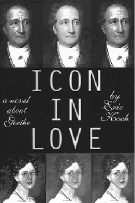
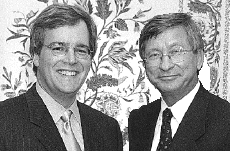
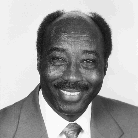

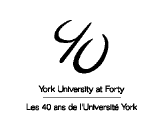
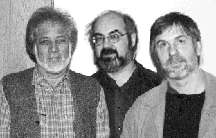
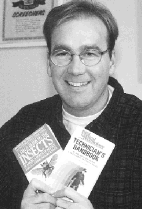 Bob Smith, superintendent of York's Grounds and Vehicles
Bob Smith, superintendent of York's Grounds and Vehicles